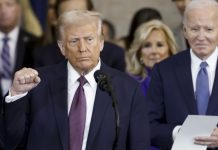TikTok has said it’s preparing to shut down Sunday.

A TikTok influencer holds a sign that reads “Keep TikTok” outside the US Supreme Court Building as the court hears oral arguments on whether to overturn or delay a law that could lead to a ban of TikTok in the U.S., on January 10, 2025 in Washington, DC. Credit: Kayla Bartkowski / Stringer | Getty Images News
TikTok has lost its Supreme Court appeal in a 9–0 decision and will likely shut down on January 19, a day before Donald Trump’s inauguration, unless the app can be sold before the deadline, which TikTok has said is impossible.
During the trial last Friday, TikTok lawyer Noel Francisco warned SCOTUS that upholding the Biden administration’s divest-or-sell law would likely cause TikTok to “go dark—essentially the platform shuts down” and “essentially… stop operating.” On Wednesday, TikTok reportedly began preparing to shut down the app for all US users, anticipating the loss.
But TikTok’s claims that the divest-or-sell law violated Americans’ free speech rights did not supersede the government’s compelling national security interest in blocking a foreign adversary like China from potentially using the app to spy on or influence Americans, SCOTUS ruled.
“We conclude that the challenged provisions do not violate petitioners’ First Amendment rights,” the SCOTUS opinion said, while acknowledging that “there is no doubt that, for more than 170 million Americans, TikTok offers a distinctive and expansive outlet for expression, means of engagement, and source of community.”
Late last year, TikTok and its owner, the Chinese-owned company ByteDance, urgently pushed SCOTUS to intervene before the law’s January 19 enforcement date. Ahead of SCOTUS’ decision, TikTok warned it would have no choice but to abruptly shut down a thriving platform where many Americans get their news, express their views, and make a living.
Ars Video
What Happens to the Developers When AI Can Code? | Ars Frontiers
The US had argued the law was necessary to protect national security interests as the US-China trade war intensifies, alleging that China could use the app to track and influence TikTok’s 170 million American users. A lower court had agreed that the US had a compelling national security interest and rejected arguments that the law violated the First Amendment, triggering TikTok’s appeal to SCOTUS. Today, the Supreme Court upheld that ruling.
According to SCOTUS, the divest-or-sell law is “content-neutral” and only triggers intermediate scrutiny. That requires that the law doesn’t burden “substantially more speech than necessary” to serve the government’s national security interests, rather than strict scrutiny which would force the government to protect those interests through the least restrictive means.
Further, the government was right to single TikTok out, SCOTUS wrote, due to its “scale and susceptibility to foreign adversary control, together with the vast swaths of sensitive data the platform collects.”
“Preventing China from collecting vast amounts of sensitive data from 170 million US TikTok users” is a “decidedly content agnostic” rationale, justices wrote.
“The Government had good reason to single out TikTok for special treatment,” the opinion said.
TikTok CEO Shou Zi Chew posted a statement on TikTok reacting to the ruling, thanking Trump for committing to “work with TikTok” to avoid a shut down and telling users to “rest assured, we will do everything in our power to ensure our platform thrives” in the US.
Momentum to ban TikTok has shifted
First Amendment advocates condemned the SCOTUS ruling. The American Civil Liberties Union called it a “major blow to freedom of expression online,” and the Electronic Frontier Foundation’s civil liberties director David Greene accused justices of sweeping “past the undisputed content-based justification for the law” to “rule only based on the shaky data privacy concerns.”
While the SCOTUS ruling was unanimous, justice Sonia Sotomayor said that “precedent leaves no doubt” that the law implicated the First Amendment and “plainly” imposed a burden on any US company that distributes TikTok’s speech and any content creator who preferred TikTok as a publisher of their speech.
Similarly concerned was justice Neil Gorsuch, who wrote in his concurring opinion that he harbors “serious reservations about whether the law before us is ‘content neutral’ and thus escapes ‘strict scrutiny.'” Gorsuch also said he didn’t know “whether this law will succeed in achieving its ends.”
“But the question we face today is not the law’s wisdom, only its constitutionality,” Gorsuch wrote. “Given just a handful of days after oral argument to issue an opinion, I cannot profess the kind of certainty I would like to have about the arguments and record before us. All I can say is that, at this time and under these constraints, the problem appears real and the response to it not unconstitutional.”
For TikTok and content creators defending the app, the stakes were incredibly high. TikTok repeatedly denied there was any evidence of spying and warned that enforcing the law would allow the government to unlawfully impose “a massive and unprecedented speech restriction.”
But the Supreme Court declined to order a preliminary injunction to block the law until Trump took office, instead deciding to rush through oral arguments and reach a decision prior to the law’s enforcement deadline. Now TikTok has little recourse if it wishes to maintain US operations, as justices suggested during the trial that even if a president chose to not enforce the law, providing access to TikTok or enabling updates could be viewed as too risky for app stores or other distributors.
The law at the center of the case—the Protecting Americans from Foreign Adversary Controlled Applications Act—had strong bipartisan support under the Biden administration.
But President-elect Donald Trump said he opposed a TikTok ban, despite agreeing that US national security interests in preventing TikTok spying on or manipulating Americans were compelling. And this week, Senator Ed Markey (D-Mass.) has introduced a bill to extend the deadline ahead of a potential TikTok ban, and a top Trump adviser, Congressman Mike Waltz, has said that Trump plans to stop the ban and “keep TikTok from going dark,” the BBC reported. Even the Biden administration, whose justice department just finished arguing why the US needed to enforce the law to SCOTUS, “is considering ways to keep TikTok available,” sources told NBC News.
“What might happen next to TikTok remains unclear,” Gorsuch noted in the opinion.
Will Trump save TikTok?
It will likely soon be clear whether Trump will intervene. Trump filed a brief in December, requesting that the Supreme Court stay enforcement of the law until after he takes office because allegedly only he could make a deal to save TikTok. He criticized SCOTUS for rushing the decision and suggested that Congress’ passage of the law may have been “legislative encroachment” that potentially “binds his hands” as president.
“As the incoming Chief Executive, President Trump has a particularly powerful interest in and responsibility for those national-security and foreign-policy questions, and he is the right constitutional actor to resolve the dispute through political means,” Trump’s brief said.
TikTok’s CEO Chew signaled to users that Trump is expected to step in.
“On behalf of everyone at TikTok and all our users across the country, I want to thank President Trump for his commitment to work with us to find a solution that keeps TikTok available in the United States,” Chew’s statement said.
Chew also reminded Trump that he has 60 billion views of his content on TikTok and perhaps stands to lose a major platform through the ban.
“We are grateful and pleased to have the support of a president who truly understands our platform, one who has used TikTok to express his own thoughts and perspectives,” Chew said.
Trump seemingly has limited options to save TikTok, Forbes suggested. At trial, justices disagreed on whether Trump could legally decide to simply not enforce the law. And efforts to pause enforcement or claim compliance without evidence that ByteDance is working on selling off TikTok could be blocked by the court, analysts said. And while ByteDance has repeatedly said it’s unwilling to sell TikTok US, it’s possible, one analyst suggested to Forbes, that ByteDance might be more willing to divest “in exchange for Trump backing off his threat of high tariffs on Chinese imports.”
On Tuesday, a Bloomberg report suggested that China was considering whether selling TikTok to Elon Musk might be a good bargaining chip to de-escalate Trump’s attacks in the US-China trade war.






